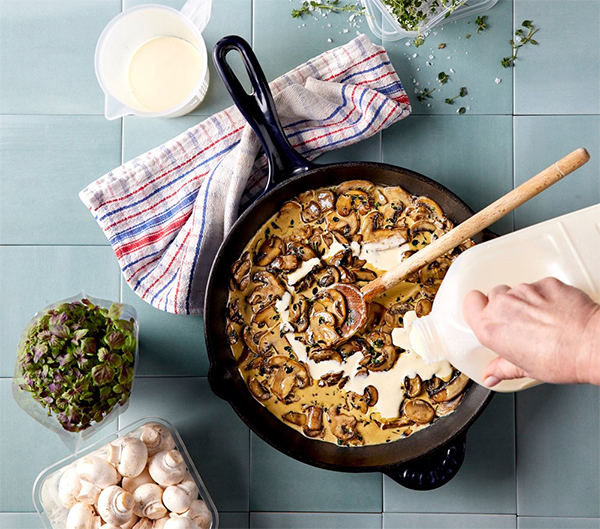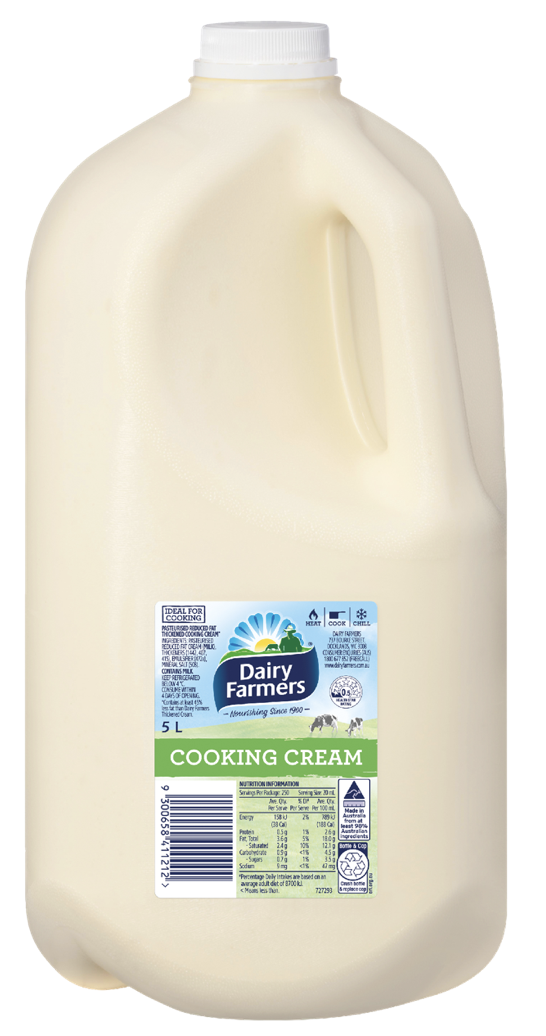Dairy Farmers Cooking Cream

Cream-based pasta sauces are not new, but the traditional approach of very heavy sauces which imparted a thick coating is giving way to a lighter, more concentrated approach.
In response to consumer demand for meals which are quicker to eat and easier to digest, chefs are creating contemporary twists on the pasta sauces of the past. Facilitating this trend is the availability of products like Dairy Farmers Cooking Cream, which makes it easier to make pasta sauces with cream while working at high temperatures over an extended period.
Consultant chef Adam Moore explains the role cream plays in pasta sauce. “It’s there to add texture and allow the other ingredients to shine. While old-fashioned cream-based sauces are certainly heavy, today’s consumers are looking for pasta sauces where the chef uses the cream as a base and then builds up the flavours from the other ingredients.

“The approach is to have the sauce lightly coating the pasta, with all the flavours shining through”
“This is quite a break from tradition and one which allows chefs to create concentrated pasta sauces into which flavours such as herb and spice notes have been infused. You might create a beautiful pesto cream sauce, or make a spinach, garlic and cream sauce with some herb notes. A lemon and herb cream sauce is an ideal contemporary choice for a prawn pasta.
“In all these examples, the approach is to have the sauce lightly coating the pasta, with all the flavours shining through, as opposed to a dense, cream-drenched dish. You can even add Cooking Cream to your red wine jus to make a beautiful sauce for a beef pasta ragout.”
|
|
“It has a higher heat resistance than any other Cooking Cream I’ve worked with.” — Consultant Chef - Adam Moore |
Adam says the process of creating these recipes is made easier by using Dairy Farmers Cooking Cream. “When you’re working with conventional cream at high temperatures and with highly acidic ingredients, such as lemon, lime or even peppercorns which are quite acidic, the composition of the conventional cream starts to break down and you get splitting or separation.
“But this isn’t the case with Dairy Farmers Cooking Cream."
“It has a higher heat resistance than any other Cooking Cream I’ve worked with. I’ve taken it from -20ºC to over 60ºC and used it to make everything from baked goods and hot sauces to desserts. It really is a highly versatile product, which makes it a must-have in the commercial kitchen.”
Adam adds its great yield and clingability makes Dairy Farmers Cooking Cream the perfect choice for pasta sauces. “It will withstand high temperature environments and acidic ingredients without separating, and its superior emulsification means you can be assured that all your ingredients will hold together beautifully within an unctuous, creamy pasta sauce.”
In preparing cream-based sauces, typically you need to bring the cream to the boil, then let it simmer until it reduces to the desired coating consistency.
“When using conventional cream, separation or over-reduction often occurs during this process,” Adam points out, “but with Dairy Farmers Cooking Cream you don’t have to worry. It will keep reducing but it won’t over-reduce – it retains its attractive thick viscosity and it doesn’t burn or stick to your pan, which makes washing up easier.”
Learn more about Dairy Farmers Cooking Cream
















